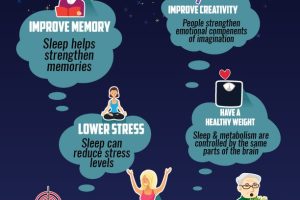The Power of Sleep: Enhancing Your Health for Simply Healthy Living

Sleep is an essential part of our daily lives, yet it often gets sidelined amid our busy schedules and constant distractions. Many individuals chalk up sleepless nights to the hustle and bustle of modern living. However, understanding the value of quality sleep goes beyond just feeling rested.
- The Power of Sleep: Enhancing Your Health for Simply Healthy Living
- The Value of Sleep
- Importance of Sleep
- Physical Health Benefits
- Mental Health Benefits
- Sleep Patterns and Circadian Rhythms
- Understanding Sleep Cycles
- Factors Affecting Sleep Patterns
- Sleep Deprivation and Its Consequences
- Short-term Effects
- Long-term Effects
- Tips for Better Sleep
- Creating a Bedtime Routine
- Improving Sleep Environment
- Impact of Nutrition on Sleep
- Foods That Promote Sleep
- Foods to Avoid Before Bed
- Stress Management and Sleep
- Relaxation Techniques
- Mindfulness and Meditation
- Exercise and Sleep
- Benefits of Regular Physical Activity
- Ideal Exercise Schedule for Better Sleep
- Sleep Disorders
- Common Sleep Disorders
- Seeking Professional Help
- Technology and Sleep
- Blue Light Effects
- Creating Healthy Screen Time Habits
- Quality Sleep for Simply Healthy Living
- The Role of Sleep in Healthy Living
- Embracing a Healthy Sleep Lifestyle
- XII. Conclusion
- Key Takeaways
The Value of Sleep
Imagine waking up refreshed, mentally sharp, and ready to tackle the day ahead. Quality sleep offers numerous benefits, including:
- Improved physical health
- Enhanced mood and emotional stability
- Boosted cognitive function
Consider a moment when a poor night’s sleep left you groggy and irritable. We can all relate to those feelings, and recognizing this pattern can help prioritize sleep as a non-negotiable aspect of our overall well-being. Through this exploration, we’ll uncover how to cultivate better sleep habits that are essential for a healthier, happier life.
Importance of Sleep
Sleep is not just a luxury; it’s a necessity that profoundly impacts both physical and mental health. As we delve deeper into the significance of sleep, it’s crucial to understand how it benefits our bodies and minds.
Physical Health Benefits
Quality sleep plays a fundamental role in maintaining physical health. Consider these benefits:
- Boosts Immune Function: Adequate sleep enhances the body’s defense against illnesses.
- Promotes Muscle Recovery: During deep sleep, muscle repair and growth occur.
- Regulates Weight: Poor sleep can disrupt hormones that control appetite, leading to weight gain.
For instance, think back to that week you prioritized sleep. You likely felt more energetic and healthier, ready to take on your workouts with vigor.
Mental Health Benefits
In addition to physical advantages, quality sleep is essential for mental well-being.
- Reduces Stress: A good night’s sleep helps lower cortisol levels, the stress hormone.
- Enhances Mood: Sleep deprivation can lead to irritability and anxiety, while proper rest fosters emotional balance.
- Improves Cognitive Function: Concentration, memory retention, and creativity thrive when you’re well-rested.
Remember that day when you could tackle challenges effortlessly after a restorative night’s sleep? That’s the power of prioritizing sleep for our mental health!
Sleep Patterns and Circadian Rhythms
As we delve further into the realm of sleep, understanding its intricate patterns and rhythms is crucial. Our bodies don’t just fall asleep and wake up randomly; they operate on a sophisticated clock known as the circadian rhythm.
Understanding Sleep Cycles
Sleep is divided into several cycles, typically lasting about 90 minutes each, encompassing:
- Light Sleep: The transition phase where it’s easy to wake up.
- Deep Sleep: Essential for bodily restoration and growth.
- REM Sleep: Associated with vivid dreams and important for memory consolidation.
Think about those nights filled with vivid dreams. That’s your brain working its magic during REM sleep!
Factors Affecting Sleep Patterns
Multiple factors can influence these sleep cycles, including:
- Lifestyle Choices: Poor diet and irregular sleep schedules can disrupt your natural rhythm.
- Environmental Factors: Noise, light, and temperature can impact sleep quality.
- Stress Levels: High stress can lead to difficulty falling asleep or maintaining sleep.
Have you ever noticed how a late evening coffee or a stressful call can throw off your sleep? Being mindful of these elements can help create a more harmonious sleep experience.
Sleep Deprivation and Its Consequences
Now that we’ve established the significance of sleep and its patterns, it’s essential to address what happens when we don’t get enough of it. Sleep deprivation can have profound effects, both in the short and long term, impacting all areas of our lives.
Short-term Effects
In the immediate aftermath of insufficient sleep, you might experience:
- Decreased Concentration: Task completion can feel like an uphill battle.
- Irritability: Minor annoyances can quickly escalate into frustrating situations.
- Increased Risk of Accidents: Reaction times slow down, leading to potential hazards, especially while driving.
Many can recall a moment when fatigue made it hard to focus at work, leading to careless mistakes.
Long-term Effects
The longer sleep deprivation persists, the more severe the consequences become:
- Chronic Health Issues: Conditions such as diabetes, heart disease, and obesity can develop.
- Mental Health Disorders: Prolonged lack of sleep is linked to anxiety and depression.
- Cognitive Decline: Sustained sleep deprivation can impair memory and decision-making capabilities.
Reflect on how lingering fatigue can cloud your judgment over time—prioritizing sleep is vital to maintaining both physical and mental health.
Tips for Better Sleep
Having explored the repercussions of sleep deprivation, it’s time to focus on practical strategies for improving sleep quality. Implementing a few simple tips can make a world of difference, helping you to embrace restful nights and productive days.
Creating a Bedtime Routine
Establishing a consistent bedtime routine can signal your body that it’s time to wind down. Consider incorporating:
- Relaxing Activities: Read a book, take a warm bath, or practice gentle yoga.
- Consistent Sleep Schedule: Aim to go to bed and wake up at the same time daily, even on weekends.
- Digital Detox: Limit screen time at least an hour before bed to reduce blue light exposure.
Think about those nights you stuck to a routine and fell asleep effortlessly.
Improving Sleep Environment
Your sleep environment plays a crucial role in achieving quality rest. To enhance your space, try:
- Darkening the Room: Use blackout curtains to block unwanted light.
- Controlling Temperature: Keeping your room cool, around 60-67°F (15-19°C), promotes better sleep.
- Minimizing Noise: Consider white noise machines or earplugs to mask disruptions.
Have you noticed how a cozy, quiet, and dark room transforms your sleep experience? By intentionally creating a conducive environment for rest, you can unlock a path to deeper, more restorative sleep.
Impact of Nutrition on Sleep
Having covered how to enhance your sleep environment and routine, let’s dive into the often-overlooked connection between nutrition and sleep quality. What you eat can profoundly influence how well you rest at night.
Foods That Promote Sleep
Certain foods are known to help promote better sleep. Consider adding the following to your evening diet:
- Turkey: Contains tryptophan, an amino acid that aids in serotonin and melatonin production.
- Almonds: A source of magnesium, which can improve sleep quality.
- Bananas: Rich in potassium and vitamin B6, both of which support melatonin production.
Imagine enjoying a warm bowl of oatmeal topped with bananas before bed—it’s not only comforting but sleep-promoting too!
Foods to Avoid Before Bed
On the flip side, some foods can hinder your ability to fall asleep. Be mindful of:
- Caffeine: Found in coffee, tea, and chocolate; it can keep you awake.
- Spicy Foods: May cause indigestion and discomfort at night.
- Heavy Meals: Large dinners can disrupt your sleep if eaten too close to bedtime.
Reflect on those nights when a late-night snack left you tossing and turning. Choosing the right foods can pave the way for more restful nights and revitalized mornings!
Stress Management and Sleep
Now that we’ve explored how nutrition can shape our sleep patterns, it’s essential to address another critical factor: stress management. Stress can significantly disrupt sleep quality, making it vital to develop effective techniques for relaxation.
Relaxation Techniques
To ease your mind before bed, consider implementing some tried-and-true relaxation methods:
- Deep Breathing Exercises: Inhale deeply through your nose, hold for a few seconds, and exhale slowly through your mouth.
- Progressive Muscle Relaxation: Gradually tense and then relax each muscle group, starting from your toes up to your head.
- Gentle Stretching: Simple stretches can help release physical tension accumulated throughout the day.
Think back to a time when you tried deep breathing after a hectic day. That calmness truly can set the tone for a restful night.
Mindfulness and Meditation
Incorporating mindfulness and meditation into your evening routine can also enhance your sleep:
- Mindfulness Practice: Focus on the present moment, observing thoughts without judgment, fostering a peaceful mind.
- Guided Meditation: Use apps or recordings designed to help you relax and unwind before sleep.
Many find that a brief meditation session before bedtime leads to clearer thoughts and a calmer spirit. Embracing these practices can create a soothing transition into sleep, promoting both mental and physical relaxation.
Exercise and Sleep
Having discussed the importance of managing stress and its effects on sleep, let’s turn our attention to another crucial factor: exercise. Regular physical activity not only keeps our bodies fit and healthy but also plays a significant role in enhancing sleep quality.
Benefits of Regular Physical Activity
Engaging in consistent exercise yields multiple benefits for sleep, including:
- Increased Sleep Quality: Regular activity can help you fall asleep faster and deepen sleep cycles.
- Reduced Anxiety: Exercise releases endorphins, which can alleviate stress and promote a sense of well-being.
- Improved Energy Levels: A well-exercised body tends to feel less fatigued during the day, creating a natural need for rest at night.
Think back to a time when you enjoyed a long walk or workout—didn’t you feel more inclined to relax and sleep well afterward?
Ideal Exercise Schedule for Better Sleep
To maximize the sleep benefits of exercise, consider the following tips:
- Timing: Aim for at least 30 minutes of moderate exercise 3-5 times a week, ideally finishing your workout at least three hours before bedtime to avoid heightened alertness.
- Variety: Engage in a mix of aerobic activities, strength training, and flexibility exercises to keep things interesting.
Whether it’s jogging, yoga, or dancing, finding an enjoyable activity can make all the difference. Regular exercise not only promotes physical health but can lead to more restful nights and refreshed mornings!
Sleep Disorders
As we wrap up our exploration of lifestyle factors impacting sleep, it’s crucial to recognize that not everyone enjoys restful nights. Sleep disorders can significantly affect both sleep quality and overall health, signaling the need for awareness and action.
Common Sleep Disorders
Some prevalent sleep disorders include:
- Insomnia: Difficulty falling or staying asleep, often linked to stress or anxiety.
- Sleep Apnea: Characterized by interrupted breathing during sleep, leading to frequent awakenings.
- Restless Leg Syndrome (RLS): An uncontrollable urge to move the legs, often causing discomfort and disrupted sleep.
Reflect on those times when you may have struggled with sleep; realizing it could be a disorder may prompt you to seek help.
Seeking Professional Help
If sleep issues persist, it’s crucial to consult healthcare professionals. Seeking help can lead to:
- Accurate Diagnosis: Understanding the specific disorder allows for tailored treatments.
- Treatment Options: These may include lifestyle changes, medications, or sleep studies.
Don’t hesitate to reach out for assistance; finding the right support can pave the way for peaceful nights and rejuvenated days! Remember, there’s no shame in seeking help for your sleep challenges.
Technology and Sleep
As we delve into the modern landscape surrounding sleep, technology plays a double-edged sword role. While it offers conveniences, it can also negatively affect our ability to get a good night’s rest.
Blue Light Effects
One of the main culprits is blue light emitted by screens from smartphones, tablets, and computers. This light:
- Disrupts Melatonin Production: Blue light can inhibit the secretion of the sleep hormone, making it harder to fall asleep.
- Interferes with Circadian Rhythms: Prolonged exposure, especially before bed, can confuse your internal clock, leading to disrupted sleep patterns.
Think back to nights spent scrolling social media or binge-watching—did you notice how difficult it was to wind down afterward?
Creating Healthy Screen Time Habits
To mitigate these effects, consider implementing some healthy screen time habits:
- Limit Screen Use Before Bed: Aim to disconnect at least one hour before sleeping.
- Use Blue Light Filters: Many devices now have settings to reduce blue light exposure in the evening.
- Create a Pre-Sleep Ritual: Replace screen time with calming activities like reading a book or meditating.
By making these adjustments, you can foster a more peaceful sleep environment, allowing technology to support rather than hinder your sleep quality.
Quality Sleep for Simply Healthy Living
Having explored various factors influencing sleep, it’s clear that quality sleep is a cornerstone of overall health and well-being. When we prioritize rest, we set the stage for a more vibrant, energetic life.
The Role of Sleep in Healthy Living
Quality sleep offers a multitude of benefits, including:
- Enhanced Physical Health: A well-rested body bolsters the immune system and aids recovery.
- Improved Mental Clarity: Adequate sleep fosters sharper thinking and better decision-making.
- Emotional Balance: Good sleep contributes to emotional stability, reducing irritability and mood swings.
Think about how much clearer your mind feels after a restful night—everything from work tasks to personal relationships benefits from better sleep.
Embracing a Healthy Sleep Lifestyle
To cultivate quality sleep, adopt the habits shared in previous sections. Create a bedtime routine, manage stress, and improve your sleep environment. The commitment to enhancing your sleep will undoubtedly pay off in a healthier, happier, and more fulfilling life. Remember, prioritizing sleep isn’t just a luxury; it’s an essential element of living well!
XII. Conclusion
As we conclude our exploration of sleep and its vital role in healthy living, it’s important to recognize that quality sleep is not a one-time goal but a continuous journey. Understanding how various factors—like nutrition, exercise, and technology—affect our sleep empowers us to take actionable steps for improvement.
Key Takeaways
Reflect on these essential points as you prioritize sleep:
- Invest in Sleep Hygiene: Create a comfortable sleep environment and establish a relaxing bedtime routine.
- Manage Stress: Incorporate mindfulness and relaxation techniques to calm the mind before bed.
- Be Mindful of Nutrition and Exercise: Choose sleep-promoting foods and maintain a regular exercise schedule that supports a restful night’s sleep.
Ultimately, embracing these practices can lead to improved health, increased productivity, and a happier life. Remember, prioritizing quality sleep is an investment in your overall well-being—because a well-rested person is a healthier, more vibrant person!





